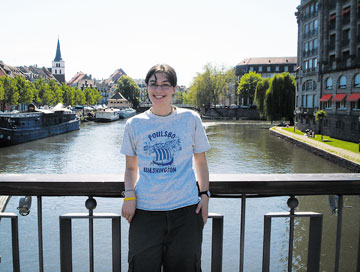The French (Dis)Connection

Jordan Small wrote this essay while participating in the College’s overseas study program to France this spring. The program focused on France’s language, history, and contemporary culture. Small, who grew up in Walla Walla, Washington, will graduate next May with a degree in international affairs.
I’ve been in France for over three months now, studying in lovely Strasbourg. Before leaving the United States, I hadn’t really thought about what it would be like to spend six months in France. It was something I had always planned on doing, and it was a big part of why I decided to come to Lewis & Clark.
Thus, upon arriving in the land of smelly cheese, smelly people, and little black berets, I was completely unprepared to deal with the gaping cultural differences. Culture shock? Yeah, just a little. I quickly discovered that all those stereotypes I’d heard about and pooh poohed in the past were true.
Yes, there are doggie surprises all over the sidewalk. It’s like traversing one of the world’s most dangerous minefields just to get to the nearest café. Yes, men urinate in public. Whether it’s late at night or in broad daylight, whether it’s under a bridge or in a corner, I’ve seen this act way too many times. Yes, slim, bitter-looking, scarf- clad women totter over cobblestones in ridiculous black high-heeled boots. Yes, cigarette smoke is impossible to avoid. Yes, cheese, baguettes, and cafés are everywhere. But despite all the cafés, not one offers coffee in a disposable to-go cup. Yes, people are cold. It’s a bloody miracle when someone says hello or smiles at you on the street. Yes, they are incredibly nationalistic, especially when it comes to food and wine. I honestly believe that most French would not admit it even if they thought an American wine was good. Yes, they work only 35 hours a week; yes, they have more vacation in a year than some Americans will ever see; and yes, they strike all the time.
All these things are hard to deal with, but what has struck me more than anything else is hearing how much my country, my home, is hated. Over the last several years, I’ve come to love and respect my country more than ever before. Whether my professors or my grandparents are to blame, I don’t know, but somehow understanding my country, my government, and how they work has made me one of America’s greatest patriots. And being in a foreign country, particularly one that doesn’t have positive feelings toward the United States, has forced me to get much better at sticking up for my homeland.
One night I was sitting in a bar with my host dad and a friend of his, a French- man in his 60s. The latter told me he just doesn’t like Americans. I quickly demanded why. As usual, he had no legitimate answer. The same man demanded to know if I was a patriot. When I answered yes, he wanted to know how I could love a country that had done so many awful things.
Loving my country doesn’t mean I love everything my country has ever done, I tried explaining in my rudimentary French. I quickly reminded him of colonialism and all the horrid things the French and Europe, in general, had done all over the world. He seemed to think that that was different.
Later in the conversation, I voiced the opinion that Europe, via the European Union, wanted to be like the United States—to have comparable power in order to counterbalance America’s influence in the world.
That comment didn’t go over too well. The two Frenchmen would never admit that their beloved, cultured, mature Europe would ever want to be anything like the United States. Explain to me then, I thought, why your cars are getting bigger, why more and more frozen food is sold in your grocery stores, why 80 percent of your music videos are American, or why your McDonald’s are never empty. For hating us so much, you sure embrace some very American things.
With all the conversations I’ve had, which, granted, do not represent all the opinions of the French, I’ve come to discover that Americans are viewed as ignorant, money-grubbing, amusing fools who are obsessed with being beautiful, obtaining oil, and taking over the world.
It’s been quite the learning experience, and I now understand why the two coun- tries don’t get along. I still have just one question: Which came first? The French hating the Americans, or the Americans hating the French?
The opinions expressed in this essay are those of the author and do not reflect the views of Lewis & Clark College.
More L&C Magazine Stories
Lewis & Clark Magazine is located in McAfee on the Undergraduate Campus.
MSC: 19
email magazine@lclark.edu
voice 503-768-7970
fax 503-768-7969
The L&C Magazine staff welcomes letters and emails from readers about topics covered in the magazine. Correspondence must include your name and location and may be edited.
Lewis & Clark Magazine
Lewis & Clark
615 S. Palatine Hill Road MSC 19
Portland OR 97219

